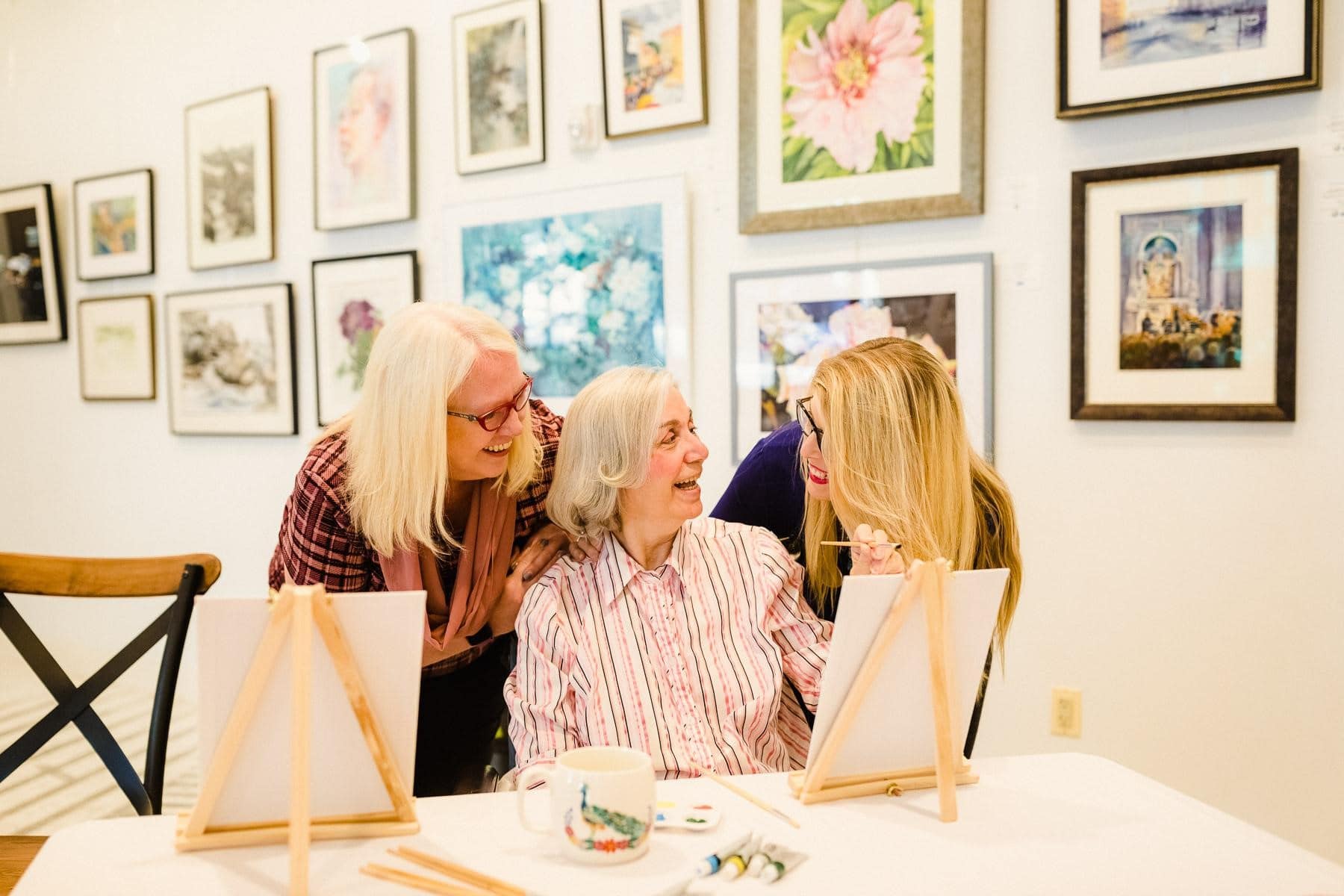The Kensington Falls Church has realized that therapies for our older loved ones can go beyond the physical body’s needs through physiotherapy and rehabilitation.
Our residents’ spiritual and mental health is just as important as their body’s well-being—it’s part of the Promise we make: to love and care for your family as we do our own.
We invite you to RSVP right away for our five-part virtual workshop series dedicated to creative caregiving, with our two July sessions focusing specifically on art and music therapy.
These transformative therapies can enrich the lives of seniors, especially those with memory loss, and establish a deeper bond between caregivers and their loved ones.
Art and music therapy: enriching lives and fostering connection
Art and music therapy have been recognized for their profound impact on seniors, particularly those living with memory loss.
Research shows that art therapy can:
- Improve cognitive and sensorimotor functions
- Foster self-esteem, expression, and self-awareness
- Promote emotional resilience
- Alleviate symptoms of depression and anxiety
- Reduce stress
This therapy also provides an avenue for social interaction, breaking down barriers, and isolation.
Music therapy, too, has a myriad of benefits—stirring lost memories and emotions, as well as reducing feelings of loneliness and disconnection. For those with dementia, familiar songs can provide comfort and spark engagement. Music therapy can also soothe agitation and provide an avenue for non-verbal communication.
In essence, art and music therapy offers a powerful means of connection and enrichment, making them invaluable tools in the caregiver’s toolkit.
Similarly, Our dedicated life enrichment team, including Michelle Williams, Erin Clark, and Mahatma Guzman, regularly incorporate art and music activities into our residents’ routines. They witness firsthand the joy and connection these therapies bring to our community.
Our summer caregiver series: goals and objectives
Our summer caregiver series aims to equip caregivers—both professional and non—with innovative strategies to navigate the challenges of caregiving.
This particular series—part of regular online events we produce throughout the year—will delve into the therapeutic potential of art and music and explore how these mediums can stimulate cognitive function, evoke memories, and foster emotional connections.
By participating in this series, caregivers will gain insights into:
- How to implement creative communication strategies
- Using music meaningfully with loved ones living with dementia
- Harnessing the power of art for the aging brain
- Prioritizing caregiver mental fitness
- Developing a weekly wellness plan for balance and joy
Meet the speakers
Our summer caregiver series features a lineup of experts in the field of aging and caregiving.
- Tara Jenkins, a Board Certified Music Therapist and Founder of Harmony in Dementia, will guide caregivers on using music as a meaningful tool in caring for loved ones with dementia.
- Braden Bishop, a caregiver advocate and former Major League Baseball player, will focus on the vital topic of caregiver mental fitness.
- Sherri Snelling, a renowned gerontologist, will offer strategies for finding balance and joy amidst the demands of caregiving.
Representatives from Opening Minds through Art at Scripps Gerontology Center will also share insights on the benefits of art for the aging brain.
Join us for parts two and three of our series
As we mentioned, this event is part of an ongoing series of workshops. We hope that you’ll join us throughout each presentation.
Meaningful music and closer bonds through art therapy
- Part II: On July 12, Tara Jenkins, Board-Certified Music Therapist and Founder of Harmony in Dementia will share her expertise on how to meaningfully use music with a loved one with dementia.
- Part III: On July 19, representatives from Opening Minds through Art will delve into the therapeutic benefits of art for the aging brain.
We encourage you to RSVP for these enlightening sessions. They promise to provide valuable tools and insights for caregivers, promoting quality time and closer bonds with loved ones through art and music therapy.
Expressive Arts therapy also has possible benefits for those without dementia
While art therapists in gerontology have traditionally focused on treating individuals with established conditions—like dementia and Alzheimer’s disease—research indicates it is also essential to recognize that their role extends beyond treatment alone.
Therapists can also make a significant impact by promoting healthy aging and potentially delaying the need for medical intervention. Many older adults face the risks of isolation, depression, and difficulty in fulfilling daily needs.
Engaging in art therapy programs offers a way for them to continue interacting with peers and their communities, fostering motivation to lead active lives.
Art therapy, it seems, holds the potential to motivate, empower, and instill confidence in older adults. Combined with rigorous outcome assessment methodologies, it can pave the way for innovative approaches to delay early cognitive decline, depression, and social isolation among older adults.
Art therapy for seniors—conclusion
Join us in exploring the transformative power of art therapy for seniors in our summer caregiver series.
Integrating these creative therapies into your caregiving routine can enhance your loved one’s well-being and strengthen your bond.
RSVP today and harness the power of creative caregiving.
The Kensington Falls Church senior living community is not just about making the lives of our residents better. We know firsthand what it takes to care for someone who has these kinds of challenges, and we want to be there for everyone else who is in the same situation.
If you’re a caregiver for someone you love who has dementia or needs assistance in the activities of daily living (ADL)—reach out to us and make a connection.
We go beyond traditional care methods and extend Our Promise to love and care for your family as we do our own.
Let us provide the tools and resources needed to improve your caregiving responsibilities and burdens.



